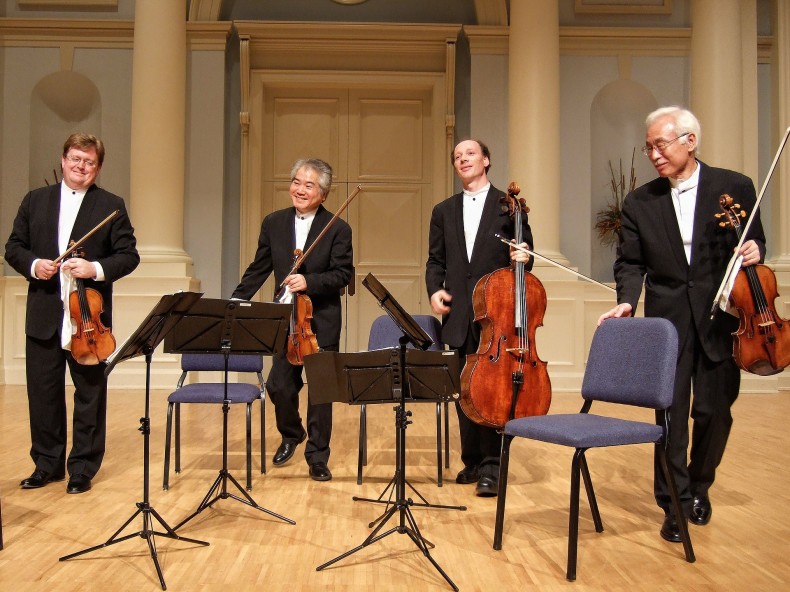The lessons from Beethoven string quartets for modern public services

A Beethoven string quartet may not seem the an obvious starting point for considering the future of modern public services, but it was such quartets that William Baumol and William Bowen picked on in the 1960s to highlight the problems with cost and productivity in the service sector.
Baumol’s cost disease (or Baumol’s coat as I always know it after misreading a hand-written note about it) argued that the problem with string quartets is that by their very nature you cannot significantly improve their productivity. A quartet is not much of a quartet if does not have four members, yet rising salaries in other jobs where productivity does increase year after year will necessarily have a knock-on effect on the salaries of string quarters, driving up their costs (not coats) despite the lack of productivity improvements.
Baumol and Brown’s full argument is rather more sophisticated, but the essential point is that in some areas of activity cost rises outstrip productivity improvements in the long-run and this is a problem particular prevalent in many of the service sectors provided by the state – which helps explains the long-run pressures for increased spending yet repeated concerns about lowering standards. It is, for example, one of the reasons why Conservative MP Jesse Norman in his The Big Society argues that it is misguided to simply look to cut costs in public services.
Even in the 1960s some productivity improvements more plausible than turning a quartet into a trio were imaginable or upping the tempo on all the music. More public performances per week and larger concert halls to allow a bigger audience for each performance, for example.
With the added perspective we now have of seeing the internet’s impact on so many aspects of life and business, that list readily becomes longer. Audiences do not simply have to be in the hall – there is an enjoyable, if different, experience from remote viewing courtesy of radio, TV or the internet. Nor do performances have to time –limited to when the quartet are on stage – think DVD and YouTube views for a start.
And more radically, what is the purpose of a string quartet? If one is to bring live music to the many, then mostly evening-only performances in a central location looks a rather staid route compared to taking music to people, especially in schools.
There was a period in the early 1990s when politicians, including many on the centre-left, were enthused with the idea of rethinking the purpose of public services in such radical ways as David Osborne and Ted Gaebler’s book Reinventing Government became the must-quote book of the time. Its time came and went, without even all the deficit-fuelled talk of needing to rethink public services having revived it.The lessons are however still applicable – even more so in fact, thanks to the greater financial pressures now than in the early 1990s and also thanks to the greater opportunities that the internet presents for doing things differently.
Take one very simple example: the public library service. Generally libraries in Britain were innovative at getting in computers, access to databases and then the internet. Libraries have changed their purpose from book repositories into a much wider source of services.
But the thinking has also stalled. When nearly all teenagers have a portable device oh so frequently in hand and in ears that can play sound files, is getting them to a physical building to pick up a printed object the local course? Or should it be more about getting audio books onto those devices?
The duplication costs of audio files are tiny compared to those of books, and it is not hard to imagine a policy mix of getting some of the very best narrators to commit to a grand program of turning out of copyright literature into an unparalleled audio library – aided by a modernising of copyright law to free up some of those texts lost in legal limbo or frozen away for unreasonably long periods of time.
In fact, if you were creating a mass literary service now, would you start with printed books in locations people have to travel to or would you start with digital?
None of this should be to downplay the benefits that the physical presence of libraries can bring – especially in bringing parents together in a venue that provides toys and in providing a location where those groups that power a healthy community (and provide far more than the market or state can either do on their own) can conveniently meet. And it’s understandable why faced with library closures many people instinctively narrow their horizons to counting how many buildings there will be in their area.
But a true respect for the wonders of the mind that libraries can bring involves applying the same willingness to think differently about library services themselves.
A slightly shorter version of this post first appeared on the now defunct Discussion Point website.
Leave a Reply